| Distributed Immersive Performance |
D.I.P |
| Vision | Experiments | Approach | People | Publications | Related Links | |
![]()
| 2006, Jun 6 | California StreamIN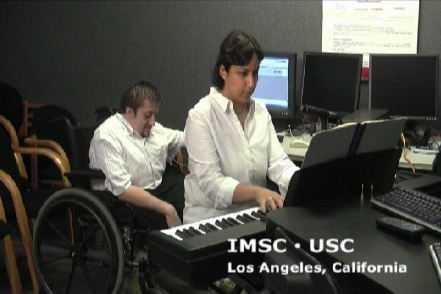
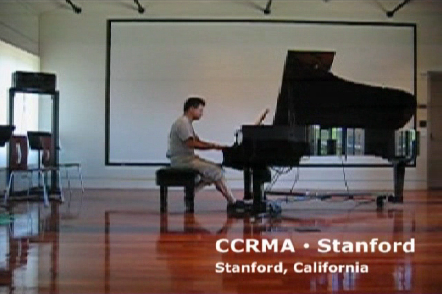 Movie [Win Media] (24.8 MB) In a collaboration between Stanford's SoundWIRE Group and USC's DIP Team, graduate students ChangHyun Kim (CCRMA, Stanford), Rob Parke and Leila Vaziri (MuCoaCo, USC), with the help of Sakire Arslan and Qin Min (DRML, USC), successfully put together and demonstrated the first phase of an extended distributed immersive performance experiment between Stanford and USC. The two-way low-latency audio-only experiment between the two sites had ChangHyun and Leila learn, practice, and perform Mozart's "Larghetto und Allegro" over the Internet.
|
| 2004, Sep 28 | Internet2 Concert Live HD Streaming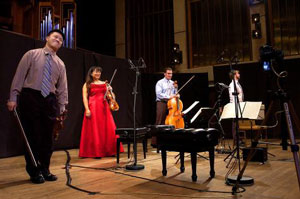
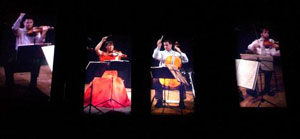 The Miró Quartet (Daniel Ching, Sandy Yamamoto, Joshua Gindele and John Largess) performs in Bates Recital Hall, UT Austin, with half the audience on location, and other half in McCullough Hall (150 yards away). The concert is rendered in HD video and 10.2-channel immersive audio. Evaluations of immersion and presence in real and virtual performances being performed with UTexas. IMSC news release: imsc.usc.edu/news/releases/i2_040929.html UTexas news: www.utexas.edu/features/archive/2004/internet.html |
| 2004 May-July | DIP v.2: Tosheff Piano Duo, duet with audio delay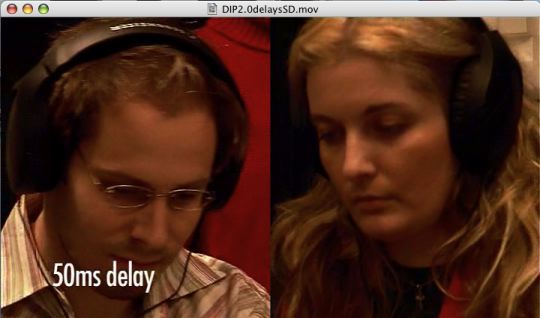
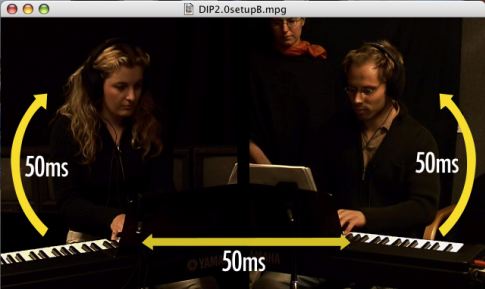 Two-way baseline user studies to measure and document qualitatively and quantitatively effects of delay and other variables on immersion, usability, and quality in the DIP scenario. Tosheff Piano Duo (Vely Stoyanova and Ilia Tosheff) on Yamaha P80 weighted action keyboards in same room facing each other, performing movements from Poulenc's Sonata for Piano Four-Hands. Recordings of duo performing with audio latency captured on May 19,21 and Jul 22,23, for four sets of conditions: A -- first time players perform under delayed conditions. B -- symmetry test (player 1 and 2 swap parts). C -- players practice to compensate for delay. D -- players perform with both partner and self delayed. The Tosheff Piano Duo: www.tosheffpianoduo.com See Publications for descriptions of Research Findings. For example, [ MUSICNETWORK2005 | NASM2004 | MUSICNETWORK2004 ] |
| 2004, January | Two-way Live HD Streaming Experiments
(Los Angeles, Hawaii, Miami) |
| 2003, June | DIP v.1: Distributed Duet (audio and video)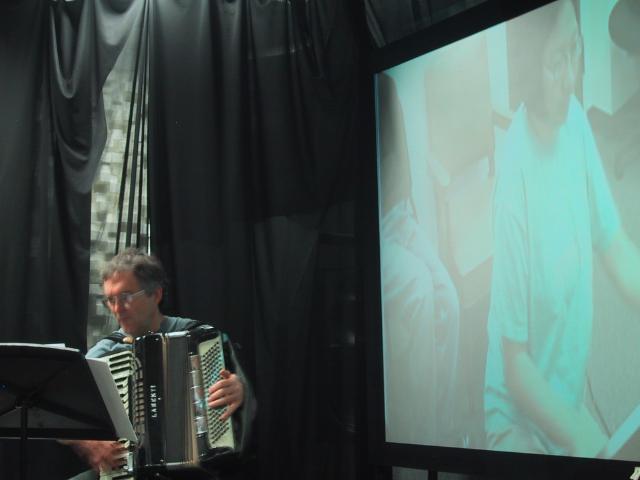
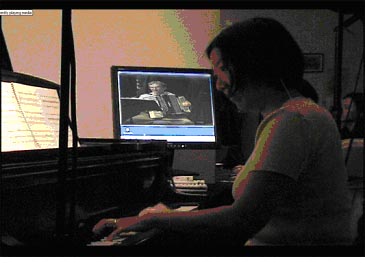 Movie 1 [Win Media] [Quicktime]
Movie 2 [Win Media] [Quicktime] RESEARCH FINDINGS: Video was unusable as source of of cues for synchronization due to delays. Audio (<<50ms RT delay) was used for cueing. Musicians compensated for delay by anticipating each others' actions and scaling back on spontaneity; some artistic licence was exercised to "make ends meet." Co-location of audience with one musician caused imbalance in control. IMSC newsletter: imsc.usc.edu/newsletter/pdfs/IMSC_News_03_10.pdf (p.3) See Publications for overview of experiments to date, e.g. [ ETP2003 ] |
| 2003, Jan 19 | Remote Masterclass (audio and video)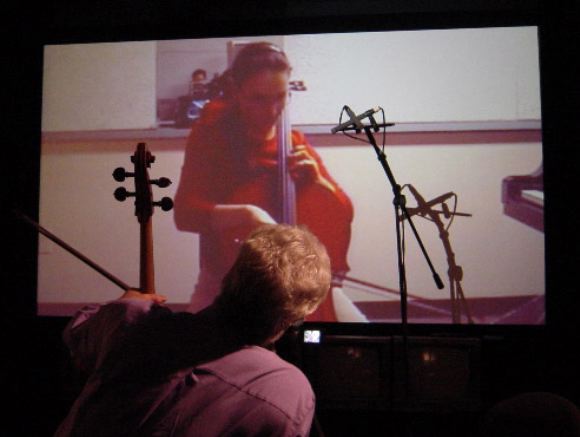 EXPERIMENT SETUP: Ron Leonard, renowned LA Phil cellist, conducts masterclass with students in New World Symphony. Teacher located in PHE106, with NWS students in Miami, Florida. At Leonard's site is 10.2-channel immersive audio by Kyriakakis and Holman. Used off-the-shelf video software/hardware (Star Valley MPEG2 codecs), large delays. RESEARCH FINDINGS: Teacher acknowledged improved presence with immersive audio: "student was really there." |
| 2003, January | Recording from streams |
| 2002, Dec 27 | Distributed Duet (immersive audio only) EXPERIMENT SETUP: Elaine Chew (keyboard) in PHE106 with stereo audio, Wilson Hsieh (viola) in EEB with Kyriakakis and Holman's 10.2-channel immersive audio. Low-latency audio streaming software created by Papadopoulos and Sinh actual delay (varying between 0ms and 300ms) controlled using Protools console. Pieces played are Hindemith's Viola and Piano Sonata No.4 in F major Op.11 and Piazzolla's Le Grand Tango. RESEARCH FINDINGS: Latency tolerance dependent on tempo of piece and onset synchronizations after pause, and timbre of instrument. Sense of acoustic presence made more "natural" by 10.2-channel audio. Perspective difference requires recording of experience at both sites. |
| 2002, Oct 29 | Cultivating communities: Dance in the Digital Age Performance event hosted by Internet2, University of Southern California, and Manhattan School of Music; held at USC's Bing Theater. Presentations include distributed performances (dance with music), and a large room RMI demonstration. Internet2 report: arts.internet2.edu/fall2002-perfevent.html IMSC newsletter: imsc.usc.edu/newsletter/pdfs/IMSC_News_02_12.pdf |
| 2002, June | Remote Media Immersion (RMI) Initial demonstrations begin. |
This material is based upon work supported by the National Science Foundation under Grant No. 0321377